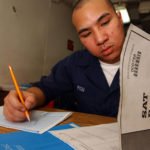How to Write the Washington State University Essays 2025-2026
Washington State University has two supplemental essay prompts that all students must submit. Both prompts focus on non-academic topics, and seek to get to know you as an individual. Take a look at our tips below to get a step up on your essays!
Washington State University Essay Prompts
All Applicants
Prompt 1: Imagine you are putting together a team to work on an issue that is important to you. Briefly describe that issue and what skills, experience, and expertise you would seek in your team members and why. (400-500 words)
Prompt 2: At the WSU Honors College we realize that applicants cannot be reduced to their academic transcripts. Pick one activity or experience and explain how it illustrates an important aspect of who you are and how it reflects on your own values or those of your community. (400-500 words)
Prompt 1
Imagine you are putting together a team to work on an issue that is important to you. Briefly describe that issue and what skills, experience, and expertise you would seek in your team members and why. (400-500 words)
For this prompt, you’ll need to showcase your leadership and problem-solving skills. This isn’t just about identifying a problem—it’s about demonstrating your collaboration mindset and understanding of what makes a team effective. In essence, you’re tasked with outlining a real-world scenario where you must gather a team of diverse talents to address a meaningful challenge. The admissions committee is looking for how you think strategically, assess strengths in others, and envision the pathway to success.
You’re being asked to:
- Identify an issue that is important to you.
- Assemble a team with specific skills, experiences, and expertise.
- Explain why each skill and person is critical to solving the issue.
To start thinking about the essay, ask yourself:
- What issue do I care deeply about? This should be a problem you have a personal connection to, which could range from environmental concerns to social justice issues to educational inequities.
- What specific actions or projects could address this issue? Are you looking to create a nonprofit, run a campaign, build a product, or design a program?
- What roles or areas of expertise will I need on my team? Think of specific skills like fundraising, data analysis, design, communication, technical development, or research.
- How do I envision these people working together? Consider how you, as the leader, will coordinate these talents and what success looks like.
- How will this team make an impact? What are the short-term and long-term goals for your project or initiative?
A good response will be deeply personal. You should have a clear reason for choosing the issue, ideally tied to a meaningful experience or passion. It will also show understanding of teamwork. You need to clearly explain the roles and value of each team member and how their combined skills are critical to the solution.
Remember to highlight leadership qualities. Admissions officers want to see how you’d lead a team. Are you decisive, inclusive, and strategic?
Finally, try to be as specific as you can be. Avoid vague statements like “I would need someone good at computers.” Instead, explain exactly what the person would do, and why their contribution is essential to the team’s success.
Let’s look at some hypothetical examples of good answers to this prompt.
- Sustainable Agriculture Advocate: A student who grew up in a rural community passionate about sustainable farming practices wants to create a program that educates small farmers on eco-friendly methods. They might bring in an agricultural scientist to develop the curriculum, a communications expert to help spread awareness, and a grant writer to secure funding for the project.
- Mental Health Awareness Campaign: A student who has personally struggled with mental health challenges wants to destigmatize the topic among high school students. Their team might include a psychologist to provide expertise, a graphic designer to create engaging materials, and a social media influencer to help reach a larger audience.
- STEM Education Access: A student who faced challenges accessing quality STEM education due to limited school resources wants to establish a nonprofit providing free online coding classes. They might bring together a software engineer to design the platform, a marketing expert to spread the word, and a teacher to ensure the curriculum is engaging and effective.
As you develop your own essay, there are some common mistakes that you’ll want to avoid. These include being too general, choosing an issue that’s too broad, and under-explaining team roles. You’ll want to avoid saying you need “hardworking” or “dedicated” team members without explaining what those qualities mean for this particular issue. Narrow your focus to something achievable, like a specific aspect of climate change or a targeted community need—this allows you to be specific, and also demonstrates that you’re in touch with what you’re capable of. While it’s good to be ambitious, you want to show you can think practically. To make the most of this prompt, don’t just list team members and their jobs—elaborate on why each role is essential and how they complement each other.
When writing this supplemental essay, choose an issue you’re truly passionate about. A topic that is meaningful to you will come across as more genuine to the readers than choosing a topic that you think the admissions committee wants to hear about. Also make sure to think carefully about the skills your team will need and how each person will contribute to your overall vision. Finally, show how you would lead this team toward achieving a meaningful and tangible goal.
Prompt 2
At the WSU Honors College we realize that applicants cannot be reduced to their academic transcripts. Pick one activity or experience and explain how it illustrates an important aspect of who you are and how it reflects on your own values or those of your community. (400-500 words)
This prompt is an example of the Overcoming Challenges or Extracurricular archetypes. The admissions committee is interested in seeing how a single activity or experience has shaped you, and how it connects to your values or those of your community. This is an opportunity to showcase your personality, growth, and maturity outside of academics.
Let’s break down exactly what this prompt is saying. You’re being asked to choose one meaningful activity or experience, explain its importance, and reflect on your values, or those of your community, and how this experience connects to those values. The goal is to show how this activity has influenced you personally, whether it’s through personal growth, a new perspective, or reaffirming your values.
Consider the following questions to help you brainstorm for this essay:
- Which activity or experience has had a profound impact on me? This could be anything from a volunteer experience, a leadership role, a family tradition, or an artistic pursuit.
- What did I learn from this experience? How has it shaped your character, attitudes, or goals?
- How does this activity or experience reflect my values? Does it relate to values like community, creativity, leadership, social justice, or personal responsibility?
- How does this experience tie into the values of my community? Does it reflect your family’s values, cultural background, or a group that you are part of?
Consider these hypothetical student examples of ideas to write about for this prompt.
- Community Theater Participant: A student who has been part of a local community theater for several years might write about how this experience has taught them the value of collaboration and self-expression. They could explain how acting has helped them come out of their shell, given them a creative outlet, and brought them closer to their community by portraying diverse stories that resonate with local audiences.
- Youth Soccer Coach: A student who volunteers as a youth soccer coach might describe how this role has taught them patience and leadership. They could reflect on how coaching young kids has helped them appreciate teamwork and the importance of being a role model, while also connecting it to the community’s value of supporting youth sports.
- Cultural Festival Organizer: A student who helps organize a cultural festival for their town might write about how the experience allowed them to reconnect with their cultural heritage while sharing it with others. They could discuss how this reflects their values of community, diversity, and preserving traditions.
Now let’s look at some good and bad examples of fully fleshed-out answers to this prompt.
Good Example:
“Every summer, I volunteer at my local animal shelter, spending hours cleaning cages, feeding the animals, and walking dogs. On the surface, these may seem like simple tasks, but this experience has profoundly influenced my values of compassion, patience, and community service. My love for animals started at a young age, but it was through volunteering that I realized the broader impact of caring for them. These animals aren’t just pets—they are companions to elderly residents, sources of comfort to families, and members of the community.
Working at the shelter has taught me the importance of empathy, not just for animals, but for people too. Many of the families who come to adopt are going through tough times—job losses, medical issues, or the loss of a loved one—and it’s rewarding to know that my work can help them find some happiness in adopting a new pet. It reflects the values of my community, where people look out for one another, always offering help where it’s needed. I’ve seen how a simple gesture—like helping someone choose the right pet—can bring joy and connection.
Through this experience, I’ve learned that caring for others, whether two-legged or four-legged, is at the core of who I am. I take this value with me into all aspects of my life, whether it’s being a supportive friend or advocating for causes I believe in. My time at the shelter has reinforced my commitment to community service, and it’s something I plan to continue wherever I go.”
Why it works: The essay highlights a specific activity (volunteering at an animal shelter) and reflects on how it has shaped the student’s values (empathy, community service). The student connects this to their larger community, showing that they have grown personally from the experience and plan to carry these values forward.
Bad Example:
“I have always loved playing soccer, and it’s one of my favorite activities. I’ve been playing since I was a child, and I’m part of my high school’s varsity soccer team. Soccer has taught me discipline, hard work, and teamwork. Being a member of my school’s team has also helped me develop my time management and leadership skills. I have to ensure that I finish all my homework before practice, and during practices I help the freshmen team train too. I believe that these values are important to being successful, and they are also values that I see in my community. My teammates and I work hard every day to improve, and I’ve learned a lot from the experience. Soccer is a big part of who I am, and it’s helped me grow as a person.”
Why it doesn’t work: This essay is too generic. While the student discusses soccer, they don’t go into any specific examples of how the activity has shaped them. The student claims to have learned lessons like “discipline” and “leadership,” but there is little personal reflection on how these skills have benefited them. There’s little personal reflection or connection to values beyond surface-level statements like “hard work” and “teamwork.” There’s no real exploration of what those values are or how they tie into the student’s experience. It’s important to avoid phrases that sound like platitudes and focus instead on unique, personal insights.
By focusing on a more specific event, providing detailed examples, and reflecting deeply on personal growth, the student can make their essay more engaging and insightful. This will give the admissions committee a clearer picture of who they are beyond their academic achievements.
Where to Get Your Washington State University Essays Edited for Free
Do you want free, nearly-instantaneous feedback on your Washington State essays? After rereading your essays countless times, it can be difficult to evaluate your writing objectively. So meet Sage, our AI tutor and advisor, who will rate your essay, give you suggestions for improvement, and summarize what admissions officers would take away from your writing. Sage can improve your chances of acceptance to your dream school by helping you show what you have to offer beyond the numbers!


